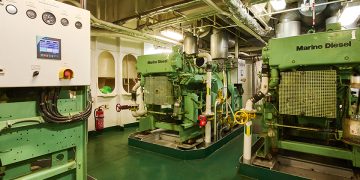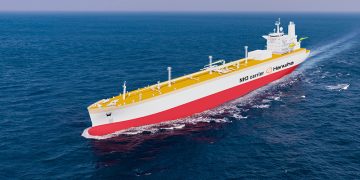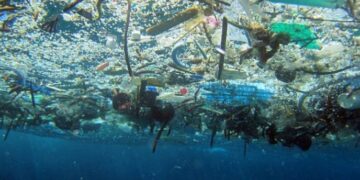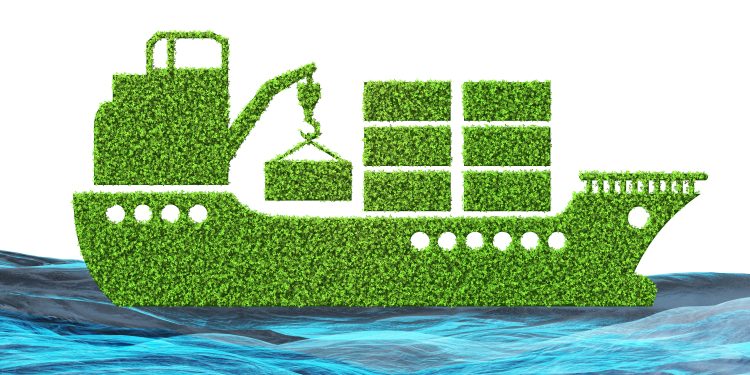DNV has released a technical update on the use of biofuels or biofuel blends to clarify the regulatory status and other considerations on the usage of such fuels.
Considering that biofuels are one of many ways to comply with the IMO’s strategy on the reduction of Greenhouse Gas Protocol (GHG) emissions from ships, DNV provides a summary of regulatory issues, safety and operational aspects. Starting with the types of biofuels, there are currently three types of biofuels are relevant for maritime shipping:
- FAME (Fatty acid methyl ester) is produced from vegetable oils, animal fats or waste cooking oils by transesterification, where various oils (triglycerides) are converted to methyl esters. This is the most widely available type of biodiesel in the industry and is often blended with regular marine diesel. International standards: ISO 8217:2017, EN 14214, ASTM D6751, EN 590
- BTL (Biomass to liquid) fuels are synthetic fuels that are produced from biomass by means of thermo-chemical conversion using the Fischer-Tropsch process or the methanolto-gasoline process. The final product can be fuels that are chemically different from conventional fuels such as gasoline or diesel but can also be used in diesel engines. International standards: EN 16709, EN 15940
- HVO/HDRD (Hydrogen vegetable oil / Hydrogenation derived renewable diesel) is the product of fats or vegetable oils – alone or blended with petroleum – refined by a hydrotreating process known as fatty acids-to-hydrocarbon hydrotreatment. Diesel produced using this process is often called renewable diesel to differentiate it from FAME biodiesel. HVO/HDRD can be directly introduced in distribution and refuelling facilities as well as existing diesel engines without any further modification. International standards: ASTM D 975
Currently, FAME is the most prominently used biofuel in marine applications. It is either used in blends with traditional petroleum fuels or as 100% biofuel
Biofuels and their effect on GHG regulations
The Maritime Safety Committee has invited all relevant IMO bodies to assess their respective involvement in the human element within their remit and report back to the committee with a view to devising an outline for a holistic approach on the human element, taking into account resource and budgetary implications within the IMO. In this regard, HTW 9 invited member states and other interested parties to submit papers to HTW 10 in February 2024.
Model training courses
IMO model courses intend to assist instructors in developing training programmes for seafarers as per the International Convention of Standards of Training, Certification and Watchkeeping for Seafarers (STCW), 1978. The model courses are subject to regular review to ensure that they are consistent with the current IMO instruments and reflect best practices and modern technologies.
HTW 9 validated a large number of model courses, as there was a backlog due to time constraints in the remote sessions of the last two years.
The following model courses are now validated and will be published soon:
- Energy Efficiency Design Index (EEDI) and Energy Efficiency Design Index for existing ships (EEXI)
The EEXI and EEDI only consider the so-called tank-to-wake approach, meaning that only the carbon content of standard reference fuels the vessel is designed for is considered. For that reason, the usage of biofuels has no effect on the EEXI or the EEDI. - CII (Carbon Intensity Index)
In view of IMO DCS reporting as well as the CII calculation methodology – as per the 2022 SEEMP Development Guidelines, Resolution MEPC.346(78), and the CII Calculation Methods Guidelines, Resolution MEPC.352(78) – in case of fuel types not covered by the guidelines, the conversion factor Cf is to be obtained from the fuel oil supplier and supported by documentary evidence.
Any non-standard approach in the determination methodology of tank-to-wake emissions for biofuels is subject to acceptance by the vessel’s flag administration as well as the RO handling the IMO DCS and CII verification on behalf of the flag, where an addition to the list of fuel types used and applicable conversion factors needs to be reflected in the SEEMP Part II.
In case of acceptance of the flag state administration, the usage of biofuels, also in form of blends with traditional petroleum fuels, will have a significant impact on the reduction of the CII value - EU MRV
As per Regulation (EU) 2015/757, in case of alternative fuels, the monitoring plan shall contain “the methodologies for determining the emission factors, including the methodology for sampling, methods of analysis and a description of the laboratories used, with the ISO 17025 accreditation of those laboratories, if any”. It is worth noting that Directive (EU) 2018/2001 (EU RED II), Annex V, Part C provides a methodology for greenhouse gas emissions from the production and use of transport fuels, whereas per point 13, the CO2 emissions of the fuel in use shall be taken to be zero for biofuels and bioliquids.
The proposed method for calculation of the CO2 emission factor for biofuel and biofuel blends should be included in the ship’s MRV Monitoring Plan along with an addition to the list of fuel types used and method for determination of fuel density, with the revised plan being subject to acceptance from the Accredited Verifier.
Biofuels and their effect on NOx regulations in IMO MARPOL Annex VI
On 10 June 2022, the Marine Environment Protection Committee approved Unified Interpretations (UIs) to Regulation 18.3 of MARPOL Annex VI simplifying the use of biofuels on board ships. It is now generally assumed that marine diesel engines certified in accordance with MARPOL Annex VI Regulation 13 should be permitted to use most liquid biofuels without the challenge of emission testing on board.
There is no need for applying an exemption according to MARPOL Annex VI Regulation 3 for testing the use of biofuels, and there is no need to follow the equivalency procedure under Regulation 4 of the Annex VI to the MARPOL Convention.
A self-check according to the Onboard Verification Procedure (to be found in the engine-specific Technical File) would be sufficient to demonstrate that biofuels do not “cause an engine to exceed the applicable NOx emission limit”.
Technical items to be observed and challenges on board. These are some of the possible consequences from the use of biofuels:
- Microbial growth: Bacteria and mould may grow, causing filters and piping to clog.
- Oxygen degradation: Biodiesel could form deposits in piping and engine, compromising operational performance.
- Low temperature: The higher cloud point may lead to the clogging of filters at lower temperatures.
- Corrosion: Some types of hoses and gaskets could degrade, leading to loss of integrity, and interact with some metallic material to form deposits.
- Possible degeneration of rubber sealings, gaskets and hoses: Important to verify that these components can be used together with biofuel.
- Conversion: When switching from diesel to biofuel, fuel filters can become clogged.




























































